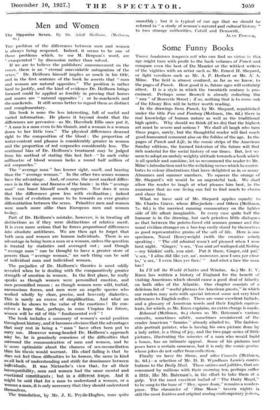Some Funny Books
THOSE laudatares temporis acti who can find no virtue in this age might turn with profit to the back volumes of Punch and compare even the best of Du Maurier or the wittiest writers of the 'eighties with an artist such as Mr. Ernest H. Shepard, or light versifiers such as Mr. A. P. Herbert or Mr. A: A. . Milne. The field is almost confined, as far as we know, to the pages of Punch. How good it is, future ages will certainly attest. It is a style in which the twentieth century is pre- eminent. Perhaps some Boswell is already collecting the " ana " of Bouverie Street ; if so, nothing that is to come Out of the Ebony Box will be better worth reading.
In the drawings from Punch, by Mr. Shepard, republished under the title Fun and Fantasy (Methuen, 10s. 6d.) there is real knowledge of human nature as well as the. traditional high spirits. Why should we think (if ace .do) that the highest art must be severe and serious ? We shall all laugh who turn these pages, surely, but the thoughtful reader will find much good-humoured comment also on the foibles of the age. In the pages of Punch and Life, in the comic strips of the American Sunday editions, the learned historian of the future will find rich material for the social history of our times. But, lest we seem to adopt an unduly weighty attitude towards a book which is all sparkle and sunshine, let us recommend the reader to Mr. Mline's introduction and to the rollicking verses which he contri- butes to colour illustrations that have delighted us in so many Almanacs and summer numbers. To squeeze the orange of Mr. Shepard's wit would be an ungrateful task. We shall allow the reader to laugh at what pleases him beat, in the assurance that no one living can fail to find much to charm and cheer him.
What we have said of Mr. Shepard applies equally to Mr. Charles Grave, whose Bluejackets—and Others (Methuen, 7s. 6d.) is the merriest running commentary on the lighter side of life afloat imaginable. In every case quite half the humour is in the drawing, but such priceless little dialogues as that between the potato-faced old seaman gunner and the usual civilian stranger on a bus-top easily stand by themselves as good representative grains of the salt of life. Here is one specimen, Naval Heavyweight (with the creative mind) speaking : "The old admiral wasn't arf pleased when I won larst night. ' Ginger,"e sez, You aint arf walloped old Nobby —my blinkin' oath, you aint. Put it there, Ginger, old pal,' 'e sez, 'I allus did like yer, an', moreover, now I sees yer close to,' e sez, I even likes yer face.' " And what a face the man has !
In I'll tell the World (Chatto and Windus, 68.) Mr. E. V. Knox has written a history of England for the benefit of visiting Americans which should cause a good deal of hilarity on both sides of the Atlantic. One chapter consists of a delicious list of "useful phrases for American guests," in which our readers may note with special interest some not very kind references to English coffee. There are some excellent ballads, and a glossary of American words and their English equiva- lents, for which, as Mr. Knox explains, no extra charge is made.
Rebound (Methuen, 8s.) shows us Mr. Bateman's various conceits, sometimes subtle, sometimes reminiscent of the cruder American " funnies " already alluded to. The fashion- able portrait painter, who is having his own picture done by a lady artist, is a thing of joy, and the two-page series of little pictures, illustrating the miseries of a man who would build a house, has an intimate appeal. Some of his pictures and poses have a certain sameness, but it is only the comic genius whose jokes do not suffer from collection. Finally we have On Straw, and other Conceits (Methaen, 3s. 6d.)—a selection of Mr. D. B. Wyndham Lewis's contri- butions to the Daily Mail. These satires and jollities, that arc consumed by millions with their morning tea, perhaps suffer a little, like Mr. Bateman's, in the effort to take them at a gulp. Yet the most excellent ballad of "` The Dairy Mayd," to be sung to the tune of "Hey, upsee Joan," remains a master- piece. The chronicler of 'Blue Moon tavern nights is still the most fearless and original amdng cririteinFSTirafy'jegters.










































 Previous page
Previous page